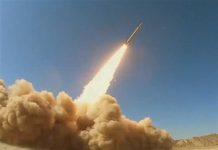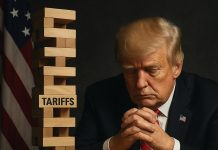By BRUCE FEIN
Now that key senators have introduced measures that would end U.S.-aided hostilities in Yemen, we can expect that a coordinated backlash from the military establishment is imminent.
The multi-trillion-dollar military-industrial-counterterrorism complex (MICC) has a business model for scuttling legislation that would end or curtail the involvement of the United States in military operations overseas.This typically involves leaking classified falsehoods, i.e., a false statement that the executive branch has classified to prohibit disclosure to the general public on the theory that disclosure might damage the national security of the United States (Executive Order 13526). Typically they will purport to demonstrate catastrophic danger or damage to the United States if Congress ends a use of the United States Armed Forces (USAF) in a designated conflict. Leaks like these will tend to fall into the hands of favored columnists like David Ignatius of The Washington Post or Tom Friedman of The New York Times
On February 28, Senators Mike Lee (R-Utah), Bernie Sanders (I-VT), and Chris Murphy (D-CT) introduced S.J. Res. 54 to terminate use of the USAF to support Saudi Arabia’s war against Yemen’s Houthis. A vote is expected this week.
The Houthis are fighting Al Qaeda and ISIS in Yemen. They were uninvolved 9/11, and they have never threatened aggression against the United States. In sum, Yemen’s Houthis are no more relevant to the national security of the United States than was Fiume or Trieste in the aftermath of World War I.
But the classified falsehoods that the MICC will selectively leak in the forthcoming days to kill S.J. Res. 54 will argue the opposite. Among other things, they will assert in official language that if the Senate Resolution passes, the global credibility of the United States will be irreparably impaired. China, Russia, North Korea, Iran, Al Qaeda, ISIS, and the Taliban will be emboldened to attack the United States; and, our allies, including NATO members, Japan, South Korea, and Taiwan, will lose confidence in our willingness to defend them.
The same bogus credibility argument was made to justify the ill-conceived and ill-fated Vietnam War. After it ended in 1975, Communist China attacked Vietnam, but it did not attack any of America’s allies, including Japan, South Korea, or Taiwan. And the Berlin Wall crumbled fourteen years later.
The MICC falsehoods will also maintain that Iran, which provides indeterminate military assistance to the Houthis, will be emboldened to seek restoration of the Persian Empire under Cyrus and Darius. It might initiate hostilities against Saudi Arabia, Israel, Bahrain, and the United Arab Emirates. It might flout the Joint Comprehensive Plan of Action that restricts its nuclear ambitions, and augment its forces now assisting President Assad in Syria and Hezbollah in Lebanon. And these developments will jeopardize the United States because Iran is listed as a state-sponsor of terrorism.
But the national security nightmare that these falsehoods portend if S.J.Res. 54 passes vanishes upon close examination. Turkey, a NATO member, would never permit Iran to become a regional hegemon. Israel is willing and able to prevent Iranian domination of Lebanon or Syria. Iran would find itself in a Vietnam-style quagmire fighting Sunnis who would unite in opposition to a Shiite theocracy. The twin sects generally view each other as infidels. Iran’s Revolutionary Guards are far from invincible. Iraq’s Saddam Hussein fought them to a standstill in the 1980-1988 Iraq-Iran War. Finally, upheaval or instability in the Middle East does not threaten the United States. The Arab Spring toppled dictators like tenpins without material repercussions for Americans. In actuality, a national security policy that spent billions on invincible self-defense but not one cent for racing abroad in search of monsters to destroy would make Americans the safest people world history.
Finally, if these classified falsehoods were credible, the MICC should be able to convince majorities in the House and Senate to introduce specific authorizations for continuing U.S. aid to the Saudi-led coalition now bombing and blockading Yemen. So far, the U.S. has aided the Saudis with mid-air refueling capabilities and aerial surveillance for their targeting bombing of Yemen with no authorization, which is a violation of the War Powers Act.
Simply put, the predictable attack on S.J.Res. 54 by the military through favored media figures that will be witnessed in the forthcoming days should be taken cum granis saltis, in other words, with a grain of salt.






















